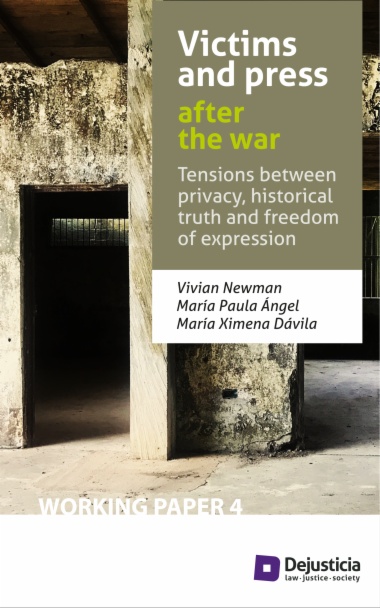The drive to conduct this research was born out of the tension that developed on May of 2017 in the context of the journalistic coverage of the exhumations of those who died in the Bojayá massacre. Thus, this document has the purpose of asking and answering, from a socio-legal perspective, the following question: How can the events related to the armed conflict and to the transition to peace be narrated without violating the right to privacy of the victims? Or, how can a journalist record a dramatic event or recount an injuste that moves readers while respecting the limits of the private lives of the victims? To answer the question, this document examines the tensions between rights that can arise out of narrating the transition to peace as part of the journalistic profession, with the hope that the conclusion set forth is valid not only for the Bojayá case, but also in future transition years, as both victims and society in general benefit from a free and responsible press and the respect for private lives.
- Cover
- Title page
- Copyright page
- Contenido
- Acknowledgements
- Introduction
- The Narration of the Conflict and the Transition to Peace
- The Purpose and Methodology of the Investigation
- Criteria for establishing limitations between rights that have come into tension
- The Rights to Privacy and Habeas Data: What Are They and to What Extent Can Interfering with Their Exercise Be Considered Legitimate?
- Right to Privacy
- Right to Habeas Data
- The Rights to Freedom of Expression and to Historical Truth in Its Collective Dimension: What Is Their Content and to What Extent Can They Be Limited Legitimately?
- The Right to Freedom of Expression
- Right to Historical Truth in Its Collective Dimension
- Case study
- Events studied
- Narration of the Events and Legitimacy of the Interference with the Right to Privacy of the Bojayá Victims
- On the Public or Private Nature of the Behavior of the Bojayá Victims
- The Events and Acts that Constitute the Exhumation Process
- The Place Where the Events That Make up the Exhumation Process Occur
- Legitimacy of the Limitations of the Narrative
- The Requirement that the Limitation of Freedom of Expression Be Established by Law in a Formal and Material Sense
- The Compelling Objective That Must Be Sought by the Limitation to Freedom of Expression
- The Appropriateness of the Measure That Limits the Right to Freedom of Expression
- The Necessity of Measure That Limits the Right to Freedom of Expression
- The Proportionality, in a Strict Sense, of the Measure that Limits the Right to Freedom of Expression
- Sub-Rules that are helpful for protecting the right to privacy without ignoring the rights to freedom of expression and to historical truth
- The Victims of the Armed Conflict Are Not Public Figures
- When the Events or Acts Involve Private Feelings It Must Be Presumed That They Are Part of the Personal Privacy of the People Who Are Present
- When the Victims Belong to a Recognized Ethnic Minority the Notion of Privacy of Their Cosmovision Should Be Taken into Account
- When Press Coverage Refers to Acts That Involve the Guarantee of the Victims’ Rights to Truth, Justice, Reparation, and Non-Repetition, It Cannot Limit the Guarantee of These Rights
- The Plurality of Truths About the Conflict and the Transition to Peace Must Be Guaranteed in All Cases
- The Regulation of the Coverage of the Events of the Armed Conflict and the Transition to Peace Cannot Imply Prior Censorship
- Recapitulation
- References
- Legislation
- Jurisprudence
- Annexes

